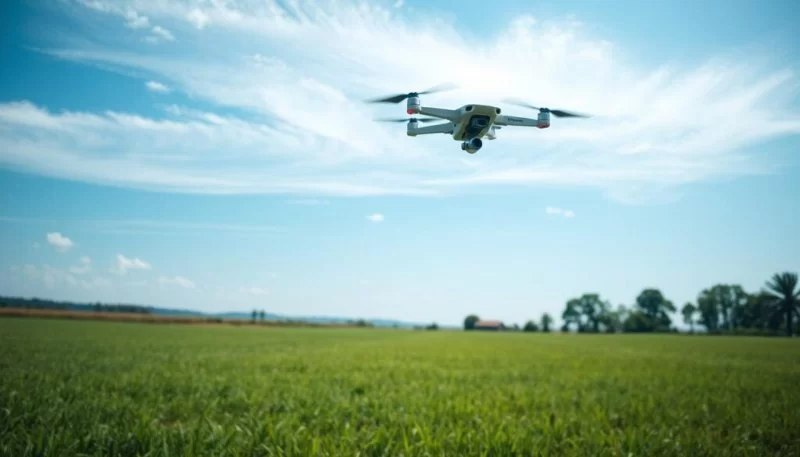Learn how to use a drone safely from your campsite with expert outdoor flying tips. Discover best practices, safety advice, and responsible drone use with Pine Cliff Resort.

- 1 - Why Drones Are Popular for Camping Adventures
- 2 - Understanding Drone Safety Rules Before You Fly
- 3 - Choosing the Right Location for Drone Flying
- 4 - Weather and Environmental Awareness While Flying
- 5 - Drone Etiquette and Respecting Privacy
- 6 - Real Camper Experience: A Lesson in Responsible Flying
- 7 - Plan Your Next Drone-Friendly Camping Trip with Pine Cliff Resort
1. Why Drones Are Popular for Camping Adventures
For many outdoor enthusiasts, camping and drones go hand-in-hand. Drones allow campers to capture breathtaking aerial views of mountain lakes, forest trails, and sunrise horizons that would otherwise be impossible to see. Beyond photography, drones can help with navigation, scouting routes, or even checking weather conditions in nearby areas. But while drones add excitement to your trip, learning how to use a drone safely from your campsite ensures that the experience remains enjoyable and accident-free.
When operated responsibly, drones transform camping into a new kind of adventure—merging technology with nature in ways that highlight the beauty of the outdoors while keeping safety at the forefront.
2. Understanding Drone Safety Rules Before You Fly
Before taking off, it’s essential to familiarize yourself with federal and local drone regulations. In the United States, the Federal Aviation Administration (FAA) requires recreational drone pilots to register their drones if they weigh more than 0.55 pounds. Drones should always remain within visual line of sight, and flying over people, vehicles, or restricted areas is prohibited.
Campers should also respect local park policies—some national parks and protected wilderness areas do not allow drone use at all. Checking these rules before your trip avoids fines and ensures you fly within safe, legal boundaries. The first step to mastering how to use a drone safely from your campsite is understanding and respecting these regulations.
3. Choosing the Right Location for Drone Flying
Choosing an open area with minimal obstacles is key to safe drone operation. Avoid flying near tall trees, cliffs, or electrical lines. Large clearings or lakesides make ideal launch zones, providing enough space for smooth takeoff and landing. Before each flight, scan your surroundings for campers, hikers, or animals that could be disturbed by the drone’s noise or movement.
Some campers use small landing pads to protect drone propellers from dust or debris. Keeping a safe distance from your campsite also reduces the risk of accidentally damaging tents, vehicles, or gear. At Pine Cliff Resort, guests are encouraged to use designated open areas for drone flights—ensuring both safety and minimal disruption to others.
4. Weather and Environmental Awareness While Flying
Weather plays a critical role in drone safety. Strong winds, heavy rain, or extreme cold can interfere with your drone’s sensors and flight stability. Always check local forecasts before flying. Even light winds can create turbulence near cliffs or tree lines, which may cause loss of control.
Environmental conditions like glare from sunlight or water reflections can also affect visibility. To ensure smooth flying, plan your drone sessions during early mornings or late afternoons when light conditions are softer. Always bring spare batteries and store them properly, as temperature fluctuations can shorten battery life significantly.
5. Drone Etiquette and Respecting Privacy
One of the most overlooked aspects of drone use is respecting other people’s privacy and peace. Avoid flying over other campsites or capturing footage of strangers without permission. Noise can easily disturb those seeking solitude in nature, so keeping flight times short and away from populated areas shows respect for fellow campers.
Good drone etiquette also includes responsible photography—focus on landscapes, not individuals. By flying courteously, you not only protect others’ privacy but also help maintain the positive reputation of drone users among the outdoor community. This is an essential part of learning how to use a drone safely from your campsite and keeping nature enjoyable for everyone.
6. Real Camper Experience: A Lesson in Responsible Flying
During one summer at Pine Cliff Resort, a traveler named Alex brought his drone to document the breathtaking sunrise over the lake. He followed all safety guidelines—kept a wide distance from campsites, avoided early morning quiet hours, and used GPS tracking to ensure a controlled flight path. However, another camper, unaware of local restrictions, launched their drone too close to the forest canopy, resulting in a crash that nearly started a fire.
This incident served as a reminder to everyone that drone operation, while exciting, requires mindfulness and responsibility. By prioritizing safety checks and environmental awareness, Alex’s example set the tone for how technology and nature can coexist harmoniously.
7. Plan Your Next Drone-Friendly Camping Trip with Pine Cliff Resort
If you’re eager to explore the skies on your next camping trip, Pine Cliff Resort offers the perfect balance of open landscapes, safety, and natural beauty. With wide lakeside clearings and clearly marked drone-friendly zones, it’s an ideal destination for travelers who want to capture their outdoor experiences from new heights.
Learning how to use a drone safely from your campsite ensures that your adventure remains both thrilling and responsible. Whether you’re capturing panoramic forest views or documenting family memories, the key lies in preparation, respect, and awareness. Visit Pine Cliff Resort to plan your next unforgettable outdoor experience—where safety meets serenity under open skies.
Douglas Tailwater Campground
829 River View Way, Kodak, TN 37764, USA
Visit Location PageCrazy Fisherman
8615 TX-103, Chireno, TX 75937, USA
Visit Location Page